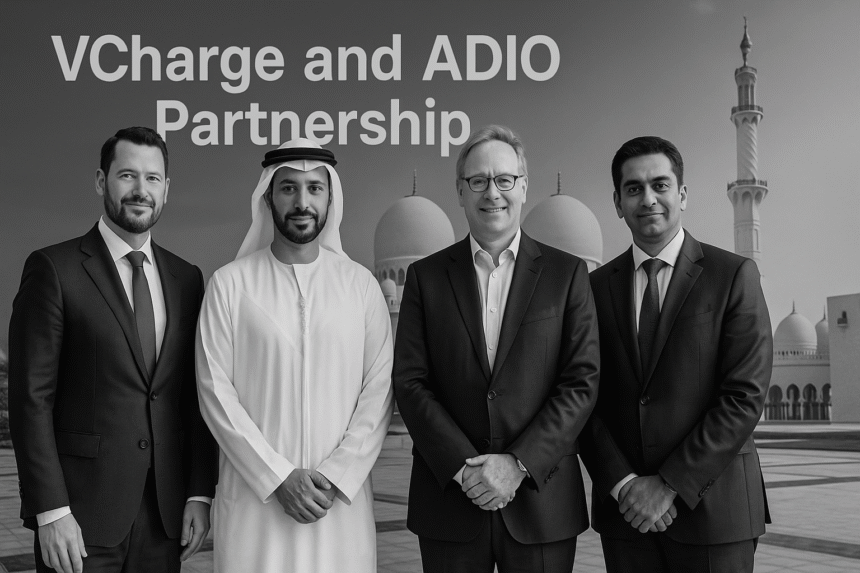VCharge and ADIO Partnership to Drive the Future of Abu Dhabi’s Automotive Industry”
That phrase stood boldly behind the four men standing shoulder to shoulder in the image shared by VCharge in a recent LinkedIn announcement — and it wasn’t just branding. It marked a defining moment in the region’s growing EV ambitions.
In a post that gathered notable engagement from sustainability experts and local industry insiders, VCharge and ADIO Partnership was revealed as a new initiative to begin local manufacturing of EV chargers in Abu Dhabi. The news was delivered in both English and Arabic — a subtle nod to the dual audience this announcement was meant to reach: global observers and the UAE’s innovation-driven leadership.
Background & Context of the VCharge and ADIO Partnership
VCharge is a clean tech company specializing in electric vehicle charging infrastructure — a core enabler of the EV transition. ADIO, meanwhile, serves as a key enabler of industrial investment under the UAE’s #MakeItInTheEmirates initiative.
By manufacturing EV chargers locally, VCharge and ADIO Partnership aligns with the country’s long-term goals:
- Boost industrial capacity
- Create skilled jobs for Emiratis
- Reduce dependence on imported components
While the LinkedIn post itself was concise, its timing was strategic. It follows the UAE’s renewed push toward sustainable mobility — especially as it positions itself as a regional hub for EV adoption and green tech.
Key Takeaways from the VCharge and ADIO Partnership Announcement
-
Localization Is No Longer Optional — It’s the Strategy
This isn’t just about building chargers. It’s about embedding manufacturing into Abu Dhabi’s economic fabric. Localizing production:
- Reduces supply chain vulnerabilities
- Supports national economic diversification
- Positions the UAE as a net exporter of clean tech
VCharge and ADIO Partnership clearly sees the writing on the wall: to play in the Gulf’s next decade, you must build in the Gulf.
-
Talent Development Is Embedded in Industrial Growth
The post highlighted ADIO’s role in “nurturing Emirati talent.”
This phrasing isn’t fluff. The UAE has tied industrial growth with local talent acceleration — and partnerships like VCharge and ADIO Partnership signal a transfer of knowledge, not just assets.
For every EV charger assembled, there’s a UAE national being trained in green tech manufacturing. The long-term benefit? A homegrown workforce that can compete globally in the clean energy economy.
-
Public-Private Partnerships Are the Real Growth Engine
This wasn’t just a win for VCharge — it’s a masterclass in how private firms can unlock government support by aligning with national policy.
ADIO didn’t just co-sign the deal; they likely helped shape it. And by doing so, they’re reinforcing their reputation as one of the most forward-looking investment arms in the region.
It also shows that public money, when aligned with private execution, can accelerate industries — not just subsidize them.
Community Reaction to the VCharge and ADIO Partnership
While most public comments were celebratory (“Incredible milestone!” and “Congratulations on this step!”), the real validation came from who liked and shared the post:
- Executives in the energy, infrastructure, and logistics sectors
- UAE-based policy professionals
- Local founders in sustainability startups
This shows that VCharge and ADIO Partnership isn’t just building products — it’s shaping perceptions, especially among those charting the UAE’s industrial future.
Our Perspective: What This Means for Contracts and Cross-Border Investors
From a legal and business standpoint, VCharge and ADIO Partnership reflects key contract trends in the Middle East industrial ecosystem:
- Local Content Requirements: Multinationals must increasingly commit to local manufacturing, hiring, or R&D to access public funding or tenders.
- Performance-Based Incentives: Government support often hinges on deliverables like job creation, tech transfer, and ESG reporting.
- IP and Licensing Protections: When foreign tech firms localize production, intellectual property frameworks must be watertight — especially if local assembly involves proprietary systems.
If you’re a foreign investor or startup considering entry into the UAE market, this case is your blueprint: build partnerships that serve both your growth and the nation’s strategic objectives.
Closing Thought
The photo says it all: a clean tech founder, a government leader, and two institutional bridge-builders — standing united under a banner that blends industrial policy and climate ambition.
So here’s the question for every startup eyeing the region:
Are you ready to move from importer to contributor? Because in today’s Middle East, that’s where the real opportunity lies.



Leave a Reply